BLOGS BY:
Defrazzle Me
Exhausted and then some...

Understanding Menopause: The Science, Effects, and Tips for Thriving
Menopause and perimenopause together are a natural phase in a woman’s life, marking the end of reproductive years. It occurs as hormone levels—particularly estrogen and progesterone—decline, typically between ages 42 and 55, though it can start earlier. Scientifically, menopause is confirmed after 12 consecutive months without menstruation.
For many, menopause lasts several years and includes three stages:
perimenopause (when symptoms begin)
menopause (the official transition)
postmenopause (life after).
Symptoms vary but may include hot flashes, mood swings, sleep disturbances, itchy eyes, a dry vagina. Reduced estrogen also impacts bone density (by up to 60%) and cardiovascular health. Estrogen also plays a huge role in regulating body weight and fat distribution. During menopause, as estrogen levels decline, several changes occur that can contribute to weight gain:
Fat Redistribution - lower estrogen levels cause fat to shift from the hips and thighs to the abdomen, leading to the so-called "menopause belly." This change in fat storage is linked to the so-called “menopause belly”.
Slower Metabolism – estrogen influences metabolic rate. Its decline slows down metabolism, meaning fewer calories are burned even when resting
Muscle Loss – menopause is associated with natural loss of muscle mass, when further reduces the number of calories burned daily as muscle tissue is more metabolically active than fat
Increased Appetite – hormonal shifts often affect hunger-regulating hormones, potentially leading to increased appetite or cravings for high-calorie foods. Increase cortisol in your system at this time can trigger the "fight-or-flight" response. This hormone increases glucose availability in the bloodstream to provide immediate energy for dealing with the stressor.
Insulin Sensitive - reduced estrogen levels can impact how the body processes sugar, leading to changes in insulin sensitivity and a higher likelihood of fat storage

Some strange menopause facts you might not know include the following:
brain fog is a real phenomenon caused by fluctuating hormones,
vocal cords can thin due to hormone drops,
menopause deeply affects sleep cycles, often linked to melatonin shifts.
To navigate this phase with ease, consider:
Regular blood testing - to assess hormone levels, thyroid function, and bone density. These tests can be undertaken at hormone level testers, thyroid function testers and bone density scanners.
Simple dietary adjustments - such as incorporating phytoestrogens from soy and flaxseeds, along with calcium and magnesium, can support hormonal and bone health.
Incorporating weight - bearing exercises, like walking or light strength training, can maintain muscle mass and bone density.
Supplements - like omega 3s, vitamin D, and magnesium can address specific symptoms, but consulting a doctor or naturopath is essential before use.
Stress management practices - such as mindfulness, yoga, or breathwork, are also effective for easing mood swings and reducing cortisol levels.
Menopause is a challenging yet transformative phase. We know it to only exacerbate burnout symptoms and often they become intertwined complicating an already complicated life. With the right strategies, you can however thrive and embrace this new chapter of life.
While at times this phase can seem similar to an unpredictable rollercoaster, remember—you’re stronger than the dips, curves, and loops. With a touch of self-care, a little curiosity, the right data and a dash of patience…remember this too, shall pass. Happy days gorgeous warriors.
For more information on where you can access local testers please contact us today at [email protected] with the subject line “Local Testers – XXX City”
Take the first step towards recovery
and book a free consultation with
Defrazzle Me today.
Let's Connect




